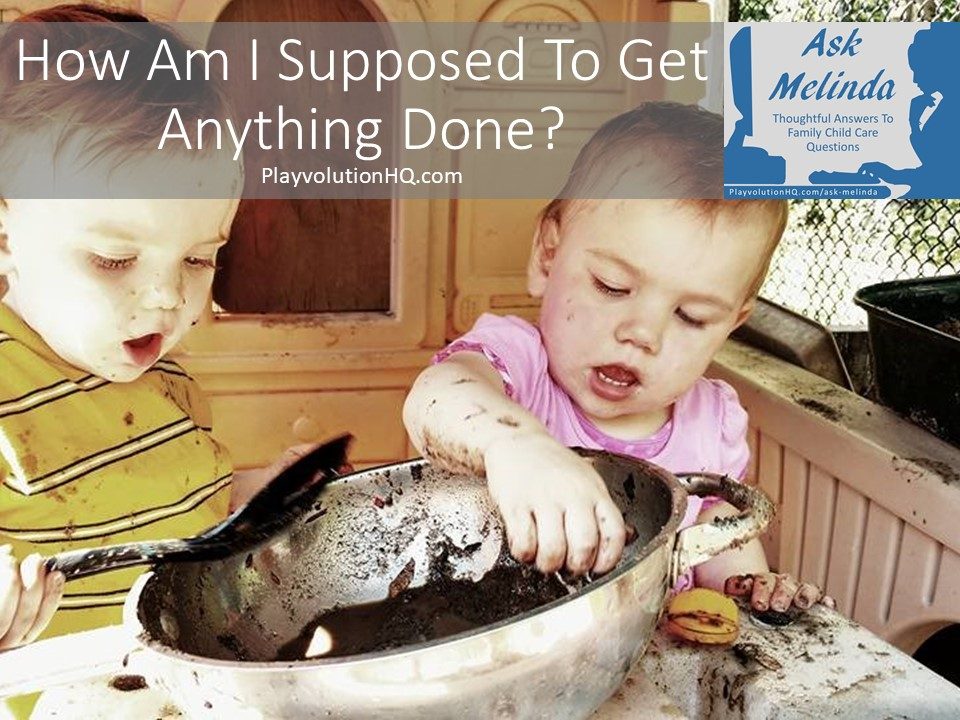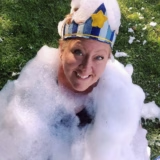
This week’s question:
I work alone and have 8 children that are infants, toddlers, and preschool age. The days are often long and sometimes hectic. Between diapers, bottles, toddler meltdowns, getting time to go outside to play, cooking and the constant cleaning, and trying to implement our preschool curriculum program with the older children, how am I supposed to manage it all throughout the day and get anything done?
Sue
This is a great question and one I hear often. We need to dissect this a bit. Let’s first take a look at priorities and then our own realistic expectations.

When you look here at the picture of Maslow’s Hierarchy of Needs, you’ll see the levels of human needs, with the most important being at the base of the pyramid. This is your foundation.
The physiological needs of the children should be at the very core of what you do. Food, water, movement, and rest are the priority. Feeling safe, secure, and knowing they are loved and cared for are equally important.
Children can not climb Maslow’s pyramid without a strong foundation.
No where does it say the floors must be swept, dishes put away, and toys perfectly organized on shelves ALL OF THE TIME.
If you are offering your children a strong foundation each day by meeting their needs for food, shelter, safety, and love…you are already doing an amazing job.
Now, lets talk about the preschool curriculum you mentioned in your question.
For years I used a prescribed curriculum. I spent hours upon hours searching my library of curriculum books and eventually the internet (remember dial up? LOL) for the perfect activities to put in my lesson plans. I think half of my life was spent cutting out templates and running my laminator. Eventually I began purchasing an already made boxed curriculum which saved me some time, but cost a lot of money.
In both instances, many times these curriculums would leave me frustrated. The children were never really interested or engaged and I felt I wasted a lot time and money.
They just wanted to play.
I began researching what play based curriculum was, and slowly implemented some of its key components. Like others, I had a hard time at first letting go of the adult led control. Once I did, the children flourished and my own stress levels subsided.
Being play based doesn’t necessarily mean easier–it takes careful planning (of other sorts) and observations. You’re still deeply engaged in what the children are learning, but when its through play (the natural way children are meant to learn) your days automatically run smoother.
I would encourage you to take a step back from teacher led curriculums and look into the benefits of implementing a play based approach.
And ditch the laminator.
Here are links to Playvolution HQ resources focusing on play:
We need to learn to manage our own expectations as well. There are always dishes to wash, laundry to do, floors to sweep, and toys to put away. Messes happen frequently, and tidying up all of the time can be overwhelming. Sometimes it feels like shoveling snow during a blizzard. As long as the children’s needs are being met, its ok if your house isn’t perfectly tidy all of the time. In fact, the children will more than likely to not even notice.
Having the children see our program run like a family is important to me. Allowing the children to see me complete household tasks is a life skills lesson in itself. Sometimes the children will join me in folding towels, setting the table, or prepping meals. This is all part of the “curriculum” and is a way to help get chores done throughout the day.
Organization and routines are certainly helpful and important, and we can discuss those more in depth later, but as adults we need to remember to play and rest too. I would take some time to reevaluate your program’s philosophy and mission, keeping in mind the children’s needs and your own. Prioritize whats most important, and remember to simply enjoy the journey.
Post Author
Melinda lives in Upstate New York and is owner of her home based program, Mountaintop Family Childcare.
She has been a family child care provider for over 18 years and worked with children for over 27 years. Her program offers relationship based care that includes many aspects of farm life and nature/forest school with PLAY at the center of all they do. She firmly believes in slowing down childhood and allowing children to develop at their own pace.
Melinda believes family childcare programs offer unique settings that have much to offer to the early learning world. She strongly supports family providers in keeping a home like atmosphere in their programs. Backed by research, she continuously advocates for children’s right to play.


Leave a Reply